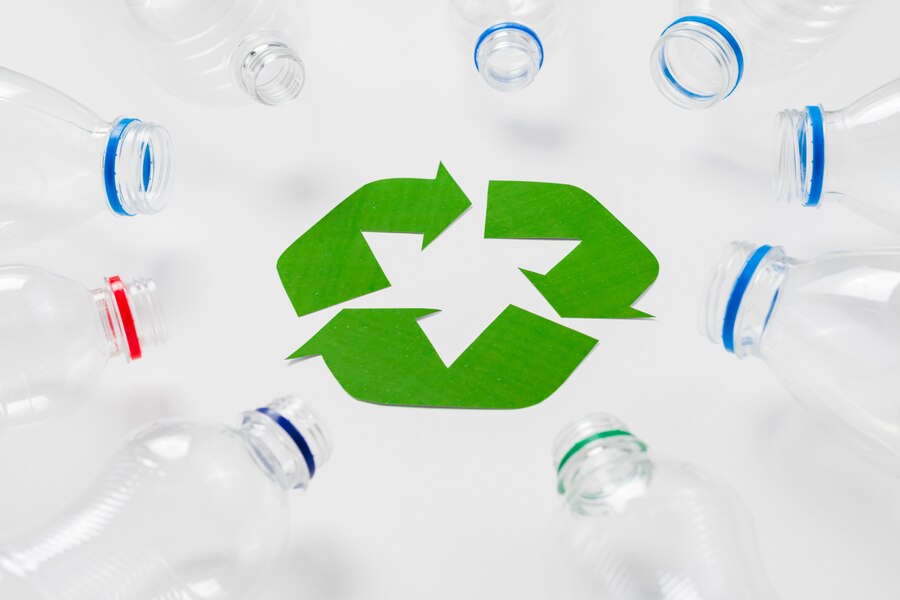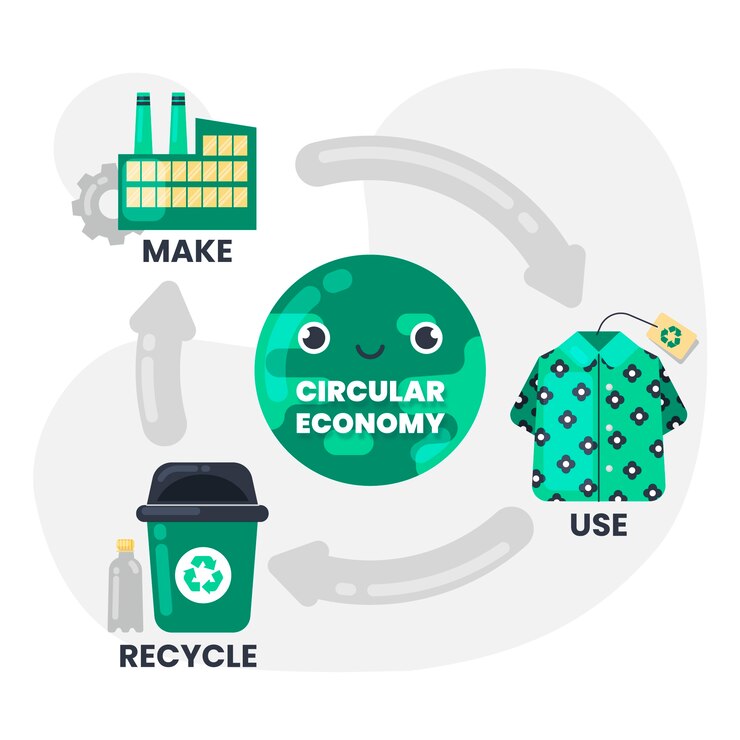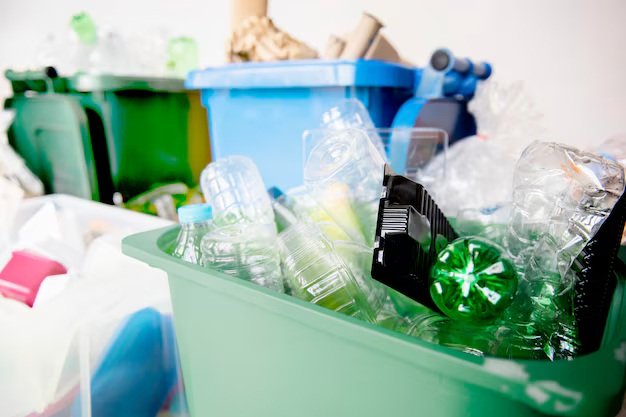Why is Recycling Plastic Good for the Environment, Health, and Sustainability?
Our reliance on plastic products is the main reason millions of tons of plastic are produced each year, and about 4% of these products are illegally disposed of in the ocean. We can all agree that recycling is a sustainable option for a greener future with less plastic waste and pollution. Prioritising recycling is not just about reducing waste; it is more about achieving environmental sustainability—conserving resources, protecting natural forests and wildlife, and reducing greenhouse gas emissions. It ensures a healthier environment that is beneficial to both human health and economic growth.
The average household around the world today uses plastic in various forms—plastic food containers, bottles, disposable cutlery—and almost every item purchased these days is packaged in plastic bags. Due to our throwaway culture, most of these plastic products end up in landfills and the ocean. Without effective recycling, more plastic would be sent to landfills, where it would persist, causing irreparable harm to the environment and marine species.

In This Article
- What Is Recycling?
- What Is Plastic Recycling?
- Why Is Recycling Important?
- The Environmental Benefits of Recycling Plastics
- Health Implications of Plastic Waste
- Economic Benefits of Plastic Recycling
- The Role of Policy in Promoting Plastic Recycling
- Conclusion: A Call to Action for a Sustainable Future
The Plastic Problem: Why Recycling is Crucial
It’s evident that plastic waste is choking our planet. Plastic waste takes an incredibly long time to decompose—according to the United Nations, plastic waste can take up to 20 to 500 years to fully break down. However, plastic does not entirely disappear from the environment; it breaks down into microplastics that continue to contaminate soil, nearby water bodies, and air.
This shows why recycling is an important and sustainable alternative to reducing plastic waste. Recycling centres are doing the environment a favour by supporting efforts to achieve a sustainable future.
What Is Recycling?
According to the U.S. Environmental Protection Agency (EPA), recycling is a process that involves collecting and converting materials that would otherwise be considered waste into new products. Recycling is a sustainable practice aimed at reducing waste and minimising the rate at which natural resources are extracted. It also focuses on mitigating global warming by reducing human-induced greenhouse gas emissions.
Recycling is the sustainable solution to a greener future with fewer waste problems, reduced air pollution, and lower carbon emissions.
What Is Plastic Recycling?
Plastic recycling is a process of collecting plastic waste and converting it into usable products. Each year, global plastic production reaches millions of tons, and without recycling, more plastic waste would end up in landfills, causing air pollution and environmental contamination.
Plastic recycling also offers economic benefits. According to the EPA, the recycling industry creates more jobs and generates billions of dollars in tax revenue.
Why Is Recycling Important?
Recycling is a sustainable solution to the world’s waste problem. It aims to conserve natural resources and protect the environment from air pollution.
According to the National Institute of Health (NIH), recycling saves non-renewable resources and consumes less energy. For example, if we hadn’t recycled paper, about 80% of wood would have been required in 2010 alone to meet the growing demand for paper. Thanks to recycling, only 20% was needed in 2010 to meet this demand.
Recycling also ensures energy conservation. The NIH notes that recycling aluminium takes 95% less energy than manufacturing new aluminium from raw materials.
Case Study: Germany’s Green Dot System
Germany is one of the countries at the forefront of achieving environmental sustainability. The European country is recognised for its effective waste management, thanks to its Green Dot system that was introduced in the 1990s. This green system requires manufacturers to pay for the packaging they produce based on its recyclability, encouraging companies to reduce packaging waste for easier recycling.
Germany recycles about 66% of its waste, one of the highest recycling rates in the world. The Green Dot system has reduced plastic waste in the country, and this initiative has also sparked innovation in packaging design and waste management technologies.
Learn More: What Is Green Living? A Path to Environmental Sustainability
The Environmental Benefits of Recycling Plastics
Let’s explore some of the benefits of recycling plastics.
#1. Reducing Greenhouse Gas Emissions
Recycling plastic is a sustainable process to reduce waste and the need for new plastic products. It effectively addresses the global plastic waste problem that contributes to greenhouse gas emissions. Manufacturing new plastic products is energy-intensive and environmentally harmful due to carbon emissions.
According to a study, recycling a ton of plastic can conserve about 2,000 gallons of oil and reduce greenhouse gas emissions by approximately 1.7 tons of carbon dioxide.

#2. Conserving Natural Resources
Recycling conserves natural resources. By recycling plastics, natural resources like oil, natural gas, and coal can be conserved. This conservation reduces the environmental impact of resource extraction, which often leads to deforestation, habitat loss, air pollution, and water pollution.

#3. Reducing Ocean Pollution
Millions of tons of plastic waste are dumped in the ocean every year. The Great Pacific Garbage Patch is a stark example of the amount of plastic waste in the ocean. Plastics in the ocean are affecting marine species, with endangered sea creatures often becoming entangled in plastic debris or ingesting it, and this can lead to starvation or even death.
By recycling more plastic, we can reduce ocean pollution and protect marine ecosystems and biodiversity.

#4. Reducing Landfill Waste
Landfill sites are not only unpleasant with their bad odours, but they also release methane, a potent greenhouse gas that contributes to climate change. Landfill gas also includes small amounts of carbon monoxide, hydrogen, sulphide, nitrogen, and ammonia. By recycling more plastic waste, we can reduce the amount of waste sent to landfills, thereby reducing methane emissions.
Case Study: Norway’s Bottle Recycling System
European countries, particularly Scandinavian nations, are at the forefront of achieving carbon neutrality in the coming decades. As one of the greenest countries in the world, Norway implemented an efficient bottle recycling system, achieving a 97% recycling rate for plastic bottles. Norway’s system is based on a deposit scheme, where consumers purchasing a beverage packaged in a plastic bottle deposit a small amount that they can reclaim once the bottle is returned for recycling.
Norway has implemented one of the smartest strategies to reduce plastic waste, significantly improving plastic recycling. The country’s green initiative highlights the importance of implementing unique recycling systems to achieve results in reducing plastic waste.

Learn More: Recycling Bin Colours and Their Meanings
Health Implications of Plastic Waste
Plastic waste pollution is not just an environmental issue—it has also raised some public health concerns. Let’s discuss how plastic recycling can mitigate potential health risks.
#1. Reducing Exposure to Toxic Chemicals
According to Consumer Reports, plastic products often contain toxic chemical compounds such as Bisphenol A (BPA) and phthalates. These harmful chemical compounds can leach into food and beverages, and this can cause serious health problems like endocrine disruption and cancer.
Recycling minimises the risk of exposure to these harmful chemicals. Recycled plastic can be used to manufacture safer and BPA-free products.
#2. Preventing Microplastics Pollution
Plastic takes a long time to decompose, and even after it does, tiny particles continue to contaminate the environment. Plastic products break down over time into microplastics, which are small enough to be ingested by humans and wildlife. Traces of microplastics have been found in drinking water, food, and the air we breathe.
While research is still ongoing to study the effects of microplastic exposure, there are growing concerns that ingesting microplastics could lead to oxidative stress, inflammation, and other serious health issues.
#3. Protecting Marine Life
Plastic waste is present in streams, lakes, rivers, seas, and the ocean. Plastic pollution is a serious issue that threatens marine life, with an estimated 700 marine species affected by plastic debris in the ocean. Marine animals can ingest tiny plastics, and this can cause serious injuries, blockages, and even death.
Protecting the ocean from plastic waste should be prioritised to avoid the loss of endangered species and the destruction of unique marine ecosystems.
Case Study: The Impact of Plastic Waste on Human Health in Indonesia
Indonesia is one of the most populated countries on the planet, and this large population contributes to the amount of plastic waste dumped into the ocean. Due to poor waste management practices, the country is facing serious health issues. In coastal communities of this Southeast Asian country, plastic waste clogs waterways, leading to frequent flooding. In these local communities, waterborne diseases such as cholera and dengue fever are very common.
Incinerating plastic is also a common practice in Indonesia. This unhealthy act releases toxic chemicals into the air, leading to respiratory problems and other health issues among residents. Prioritising environmental sustainability by recycling more plastic products can help local Indonesian communities reduce these health risks and improve the quality of life.
Economic Benefits of Plastic Recycling

#1. Job Creation
The recycling industry has created numerous employment opportunities. According to the NIH, recycling 10,000 tons of waste can generate up to 36 jobs, compared to six jobs for landfilling the same amount of waste.
In California, the recycling industry employs over 45,000 workers, while Massachusetts create over 9,000 jobs in the recycling sector. These positions range from collection and processing to manufacturing new products from recycled materials.
#2. Revenue Generation
Recycling generates revenue by selling recycled materials. For instance, plastics can be recycled to produce other products like construction materials, furniture, and clothing. Governments can generate revenue through recycling programs by selling recycled materials, reducing waste and saving on landfill costs.
#3. Reducing Waste Management Costs
Recycling reduces landfill use and the need to incinerate solid waste, offering a cost-effective waste management method. Recycling plastic waste can help municipalities save money on waste disposal, allowing funds can be redirected to other public services.
Case Study: The Economic Impact of Recycling in South Korea
South Korea has made efforts to prioritise recycling by implementing recycling programs that not only focus on reducing waste but also create economic opportunities. The recycling industry in South Korea generates billions of dollars in revenue every year and employs about ten thousand individuals.
The country has achieved success with its recycling industry and programs, all thanks to its strict waste management policies. South Korea has shown its commitment to a sustainable environment with its recycling programs that also contribute to economic growth.
Learn More: Why Reuse Is Better Than Recycling
The Role of Policy in Promoting Plastic Recycling
Government policies play a crucial role in promoting plastic recycling. Here are some examples of successful policies for change.
#1. Extended Producer Responsibility (EPR)
Extended Producer Responsibility (EPR) policies require manufacturers to be accountable for the lifecycle of their products. These policies encourage businesses to create products that are easy to recycle and to minimize waste during production.
Canada and Germany are examples of countries that have implemented EPR policies to reduce waste and improve recycling rates.
#2. Deposit Return Scheme
The deposit return schemes incentivise customers to recycle plastic bottles by offering financial rewards. For example, Norway and the UK used this scheme effectively to reduce waste and increase recycling rates.
#3. Bans on Single-use Plastics
Banning single-use plastic can significantly help reduce plastic waste. Many countries have implemented policies to ban plastic straws, bags, disposable utensils, and bottles. The EU and the East African nations, such as Kenya and Rwanda, have successfully banned single-use plastics as part of their efforts to reduce plastic waste.
Conclusion: A Call to Action for a Sustainable Future
Recycling is a sustainable solution to reduce waste. Its key benefits include preserving natural resources, creating jobs, reducing air pollution, and protecting marine species. However, while recycling is crucial for the environment, it also g might not be enough to combat climate change. We can do more by choosing greener alternatives to plastics.
Our actions can make a huge difference in fighting against global warming. Why use single-use plastics when there are sustainable alternatives that you can reuse repeatedly?
If we don’t take action, landfills will continue to expand, leading to environmental pollution and contamination. Recycling is a sustainable solution to a greener future with fewer waste problems, reduced air pollution, and lower carbon emissions.
The time for change is now. We must take action to ensure plastic recycling remains integral to our efforts to achieve environmental sustainability







